Riga, Latvia - Evita Lune, Partner at Pedersen & Partners, interviewed Susanne Hannestad, CEO of Fintech Mundi, for RigaTechGirls.
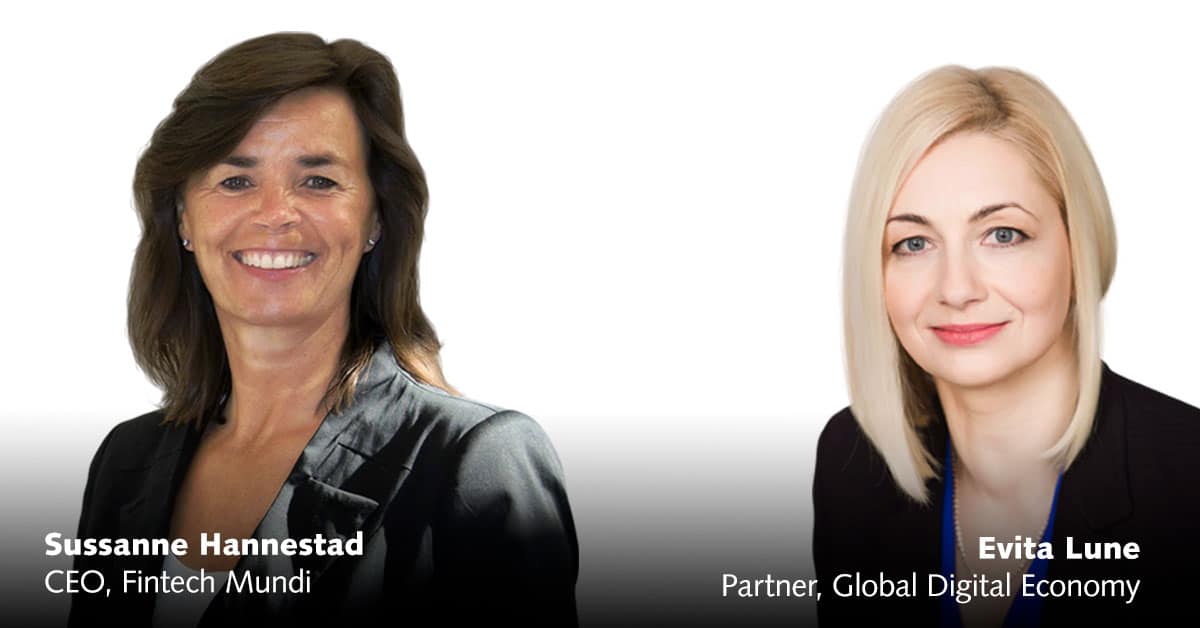
Evita: Susanne, you have held powerful roles for over 18 years now. You have taken on impressive Board responsibilities for various Tech, Fintech and Financial Services companies. So, how did you get here?
Susanne: When I was with Nordea – remember that banks are obliged to follow strict legislation about appointing Board members – I was able to access positions on associated Boards, such as Visa Norway, MasterCard Forum and eventually MasterCard Europe. I believe the position I held in Nordea and my external visibility both contributed to my ability to get other board positions. At Nordea, we innovated a lot over the years, and acted as intrapreneurs. Of course, all the changes we made attracted media coverage – we were first to bring in chip cards in 2004, we were first with many other things going forward, and we started card acquisition from scratch in Norway – and these exposures helped to raise my public profile.
Evita: What about your personal challenges? In order to achieve such a high position, and just as importantly to stay there, you must have held these executive positions for long periods of time. So, what does it take from you in terms of learning, work-life balance, self-discipline, and any other pressures?
Susanne: I was headhunted as a manager when I was 28, and since then I have always held managerial and executive positions. I believe that I connect well with people, and get good ideas from people. I have always been ambitious on behalf of the unit or the company I’m leading, and the people I work with love being a part of a growing business, and seeing it going forward. When I was younger, I played on a handball team, and when I worked together with my team-mates, I always knew what the goals were. I think that this focus is my most important character trait. I have always been a keen learner, whether formally at schools or more practically within companies, and I have always learned a lot from talking to people. My focus has been on growth in all aspects, lifting the person, lifting the unit, and on being an agent for change, to make sure that we get the growth. Finally, you should always make sure that you have time for yourself in doing what you do.
Evita: What about the innovation aspect that you mentioned? In the field of technology, quite a lot of knowledge is required – were you ever afraid to play with technologies and participate in this innovative growth, driving innovation, creating something new and having people follow you, especially in an area which is changing so fast?
Susanne: Banks are conservative, so I wouldn’t say it’s easy, but it is possible as long as you understand the powerplay and politics within a bank or a larger corporation before you come up with new things, and as long as you demonstrate that your innovations are good for the bank or corporation going forward. I believe that the greatest challenge is to manoeuvre and understand the corporate politics. Technology units usually have a lot of good people, so it is important to get together and make sure to present the ideas in a way that is interesting and beneficial for the executive management or the Board.
Evita: In terms of being proactive and participatory, many people are quite smart but prefer to stay in the shadows. They are often afraid to speak up and say something which might not be received well, or else they just don’t have this drive to be in the frontline and in leading positions. So, did you undergo some discomfort when taking on leading positions? How did you handle this interpersonal part, and did you ever think, “Why should I be the one”?
Susanne: I always make sure that my people are with me. I also make sure that I use my communication skills with both my employees and my bosses, not always focusing horizontally. When I communicate upwards, my strength comes from knowing that my team is on my side and has my back. It is vital to share achievements and celebrate; every time we had a launch, we would cheer for each other! It is also important to make sure that my community – the people around me – are happy that we are moving forward successfully, and this encourages them to buy into the innovations. Of course, you will always have laggards, but eventually they will see the light if the unit continues to move quickly and reach milestones.
Evita: And now, let’s talk about your newest project, Fintech Mundi. What motivated you to establish it?
Susanne: I was with Nordea for 10 years until I left in 2012, but I became a chair of the Fintech company Zwipe three years before that, although the word “fintech” did not exist in 2009! This worked out so well that they wanted me to be their Executive Chair, so I left Nordea and worked for Zwipe until 2015. While at Zwipe, I realised there are so many Fintech companies out there, that Fintech was becoming a global trend, and that many Fintech companies were going to escalate in volume. I got in contact with a South African in London, a Briton in Tel Aviv and an Irish person in Dublin, and we discussed the ways in which we could help Fintech companies to scale with our experience and networks, building up companies to create a Fintech ecosystem – back then, accelerators and incubators were still in their infancy. That was the start of Fintech Mundi. What also motivated me was the entrepreneurship. Banks are conservative, and at this point they were still stuck in the financial crisis and caught up in the recession. But at the same time, there was all this innovation with the Fintech companies always in front, growing, with younger people, very tech-savvy and so forth. As a kind of facilitator, I thought that was very interesting and it gave me a lot of energy. Of course, I love the international space – the wider, the bigger, the better for me.
Evita: Perhaps you could highlight the hottest Fintech companies from Norway – no, not Fintech Mundi yet, that will be my next question! But in terms of what our readers should know about Norwegian Fintech, which names would you mention?
Susanne: There are several! A few niche bankers such as Aprila, and an older one, Bank Norwegian, which is doing interesting things with consumer lending. I would also like to highlight Huddlestock, which is more investment-focused. They have a dashboard and sell into bank markets, it’s B2B and kind of a white label, ever since they realised it’s easier to do B2B than B2C. Another B2B fintech is Quantfolio, selling mostly to banks. Finally, I would like to mention Neonomics, which provides open banking – they have more than 1,300 banks in 25 European countries, and are growing fast. There is fierce competition in the open banking arena.
Evita: If you could highlight a little bit about Fintech Mundi now, what are the interesting start-ups that everyone should know – in particular, are there any that have especially high potential or a nice objective?
Susanne: Fintech Mundi operate across the Nordic and Baltic states. I would highlight the up-and-coming Finnish company – Cloud Asset – a month ago, they won an award in Finland at the Forum. Two others to watch are both from Sweden – Acuminor, which is a credit risk assessment company, and Doconomy, a company that offers sustainable banking – and I believe that each of them offers something unique, something different.
Evita: Now I will ask just one question related to the gender aspect. Why should girls and women stay close to technology and develop their careers there, either as specialists or as leaders or as entrepreneurs?
Susanne: Entrepreneurships are fun, risky and very rewarding and we need both genders and diversity. I’d say that the Nordics are quite liberated, but women need a little bit more incentive to invest and found companies, so the awareness is there. We need to have a balance of all categories of diversity.
The majority of students in law, medicine and business are women, way above 50%, but in technology it’s a little bit lower, although I think that is changing. You need all aspects; even if some women and girls are afraid of math, science or technology, we need all types of professions to build tech companies. We need leadership, and girls and women are good at leading. They just need the confidence and understanding, and maybe they need a role model to understand. This shouldn’t be a hindrance – it’s a mental barrier, both individually and in society, so Go Do, Go Make!
Collaboration is the new innovation. It is important for so many aspects of business – for Fintech, and also for banks – because as a leader, you can’t stand alone, you need to collaborate. In technology, you see that there is a need for your product, but you also need to make sure that you interact with the customers, and that your functionality is appropriate. In the past, people thought knowledge was power, but now we know that sharing knowledge is even more powerful.
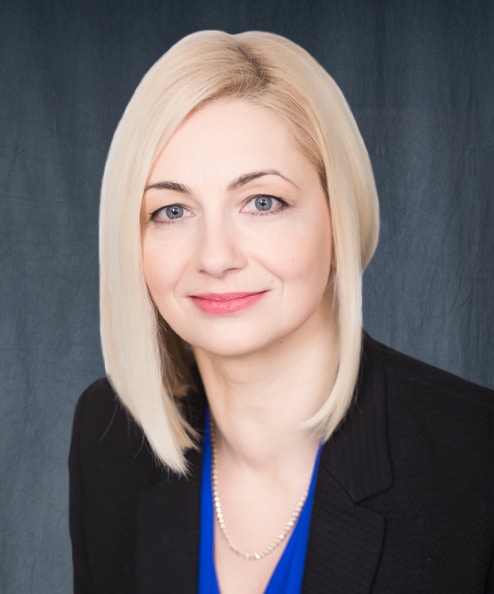 Evita Lune is a Partner who drives the firm’s Global Digital Economy. She has completed over 100 senior level assignments in over 40 countries within this practice, out of her total portfolio of over 600 assignments. Ms. Lune works extensively with FinTech clients from the Nordics and supports their global expansion plans on all continents by providing effective executive search solutions. She also supports clients in the Middle East and South East Asia with bringing Nordic talent to drive digital transformation in other geographies. Her previous experience includes three years with the Stockholm School of Economics in Riga as the Executive MBA Program Director and six years with Shell in international and regional marketing management functions in Riga, Budapest, and Brussels. Ms. Lune was a speaker at the CEE FutureTech congress in Warsaw – one of the most important business summits in Central and Eastern Europe and participated in the Blockchain Pre-Accelerator Program at University of Latvia. She is also a blogger for RigaTechGirls, a Jury Member of CEE Capital Markets and FinTech Awards and a Contributing Advisor at the Digital Freedom Festival. Ms. Lune was recognised by Forbes as one of the top 25 most influential women in Latvia for two years in a row. Ms. Lune has a PhD in Social Economy. Evita Lune speaks fluent Latvian, English, and Russian and has passive fluency in German, Swedish, and Polish.
Evita Lune is a Partner who drives the firm’s Global Digital Economy. She has completed over 100 senior level assignments in over 40 countries within this practice, out of her total portfolio of over 600 assignments. Ms. Lune works extensively with FinTech clients from the Nordics and supports their global expansion plans on all continents by providing effective executive search solutions. She also supports clients in the Middle East and South East Asia with bringing Nordic talent to drive digital transformation in other geographies. Her previous experience includes three years with the Stockholm School of Economics in Riga as the Executive MBA Program Director and six years with Shell in international and regional marketing management functions in Riga, Budapest, and Brussels. Ms. Lune was a speaker at the CEE FutureTech congress in Warsaw – one of the most important business summits in Central and Eastern Europe and participated in the Blockchain Pre-Accelerator Program at University of Latvia. She is also a blogger for RigaTechGirls, a Jury Member of CEE Capital Markets and FinTech Awards and a Contributing Advisor at the Digital Freedom Festival. Ms. Lune was recognised by Forbes as one of the top 25 most influential women in Latvia for two years in a row. Ms. Lune has a PhD in Social Economy. Evita Lune speaks fluent Latvian, English, and Russian and has passive fluency in German, Swedish, and Polish.
Pedersen & Partners is a leading international Executive Search firm. We operate 57 wholly owned offices in 53 countries across Europe, the Middle East, Africa, Asia & the Americas. Our values Trust, Relationship and Professionalism apply to our interaction with clients as well as executives. More information about Pedersen & Partners is available at www.pedersenandpartners.com
If you would like to conduct an interview with a representative of Pedersen & Partners, or have other media-related requests, please contact: Diana Danu, Marketing and Communications Manager at: diana.danu@pedersenandpartners.com









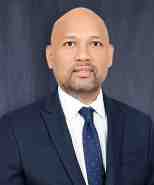


 Evita Lune is a Partner who drives the firm’s Global Digital Economy. She has completed over 100 senior level assignments in over 40 countries within this practice, out of her total portfolio of over 600 assignments. Ms. Lune works extensively with FinTech clients from the Nordics and supports their global expansion plans on all continents by providing effective executive search solutions. She also supports clients in the Middle East and South East Asia with bringing Nordic talent to drive digital transformation in other geographies. Her previous experience includes three years with the Stockholm School of Economics in Riga as the Executive MBA Program Director and six years with Shell in international and regional marketing management functions in Riga, Budapest, and Brussels. Ms. Lune was a speaker at the CEE FutureTech congress in Warsaw – one of the most important business summits in Central and Eastern Europe and participated in the Blockchain Pre-Accelerator Program at University of Latvia. She is also a blogger for RigaTechGirls, a Jury Member of CEE Capital Markets and FinTech Awards and a Contributing Advisor at the Digital Freedom Festival. Ms. Lune was recognised by Forbes as one of the top 25 most influential women in Latvia for two years in a row. Ms. Lune has a PhD in Social Economy. Evita Lune speaks fluent Latvian, English, and Russian and has passive fluency in German, Swedish, and Polish.
Evita Lune is a Partner who drives the firm’s Global Digital Economy. She has completed over 100 senior level assignments in over 40 countries within this practice, out of her total portfolio of over 600 assignments. Ms. Lune works extensively with FinTech clients from the Nordics and supports their global expansion plans on all continents by providing effective executive search solutions. She also supports clients in the Middle East and South East Asia with bringing Nordic talent to drive digital transformation in other geographies. Her previous experience includes three years with the Stockholm School of Economics in Riga as the Executive MBA Program Director and six years with Shell in international and regional marketing management functions in Riga, Budapest, and Brussels. Ms. Lune was a speaker at the CEE FutureTech congress in Warsaw – one of the most important business summits in Central and Eastern Europe and participated in the Blockchain Pre-Accelerator Program at University of Latvia. She is also a blogger for RigaTechGirls, a Jury Member of CEE Capital Markets and FinTech Awards and a Contributing Advisor at the Digital Freedom Festival. Ms. Lune was recognised by Forbes as one of the top 25 most influential women in Latvia for two years in a row. Ms. Lune has a PhD in Social Economy. Evita Lune speaks fluent Latvian, English, and Russian and has passive fluency in German, Swedish, and Polish.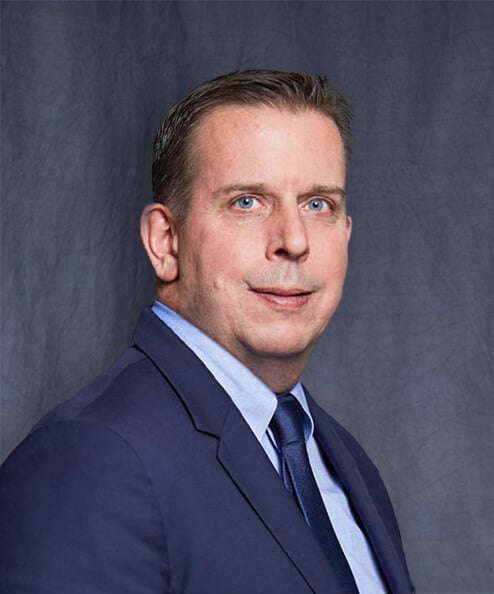 “Asia Pacific is constantly increasing its demand for global executives who are attuned to the business, social, economic, and performance requirements imposed by the market realities. At Pedersen & Partners, we are ideally placed to meet this need by bringing together a top-performing team of experienced consultants who have a deep understanding of the markets and industry sectors. We place great emphasis on convening the “Best Team Forward” for each of our clients, and Jenny Wong has the perfect balance of market knowledge, industry expertise, and executive search experience to be a great fit for our firm. Jenny will help steward the expansion of Pedersen & Partners’ presence in Malaysia and across the entire APAC region,” stated
“Asia Pacific is constantly increasing its demand for global executives who are attuned to the business, social, economic, and performance requirements imposed by the market realities. At Pedersen & Partners, we are ideally placed to meet this need by bringing together a top-performing team of experienced consultants who have a deep understanding of the markets and industry sectors. We place great emphasis on convening the “Best Team Forward” for each of our clients, and Jenny Wong has the perfect balance of market knowledge, industry expertise, and executive search experience to be a great fit for our firm. Jenny will help steward the expansion of Pedersen & Partners’ presence in Malaysia and across the entire APAC region,” stated 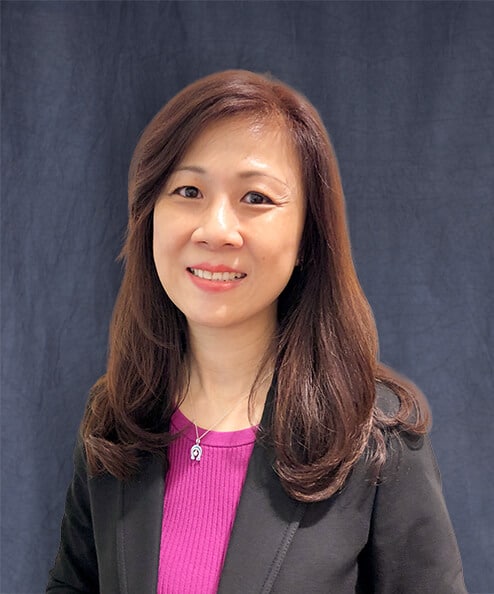 “I’m enthusiastic about joining Pedersen & Partners and adding a new milestone to my Executive Search and Board consulting experience portfolio. The firm’s Technology, Financial, and Professional Services practices have assembled strong teams of search professionals with experience in different countries, providing a multicultural and diverse vision about the needs of these sectors. I look forward to joining forces with them and supporting clients across the Asia Pacific region,” added Jenny Wong, Client Partner at Pedersen & Partners.
“I’m enthusiastic about joining Pedersen & Partners and adding a new milestone to my Executive Search and Board consulting experience portfolio. The firm’s Technology, Financial, and Professional Services practices have assembled strong teams of search professionals with experience in different countries, providing a multicultural and diverse vision about the needs of these sectors. I look forward to joining forces with them and supporting clients across the Asia Pacific region,” added Jenny Wong, Client Partner at Pedersen & Partners.
